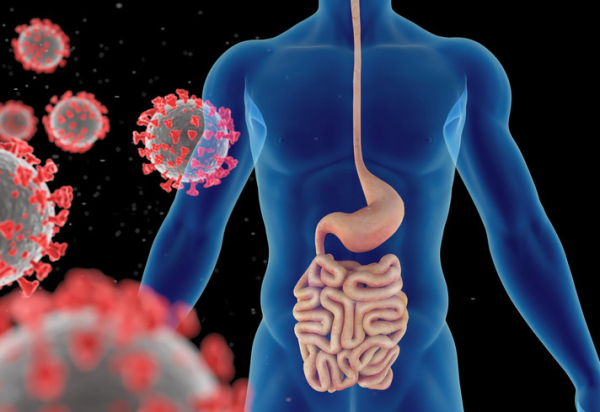 Low energy, brain fog, and lung problems are a few of the lingering aftereffects reported by some people who have had COVID-19. Could gut troubles also fall among the constellation of chronic symptoms that people with long-haul COVID experience? And if so, what do experts suggest to help ease this?
Low energy, brain fog, and lung problems are a few of the lingering aftereffects reported by some people who have had COVID-19. Could gut troubles also fall among the constellation of chronic symptoms that people with long-haul COVID experience? And if so, what do experts suggest to help ease this?
What happens to the gut during a COVID infection?
As we head into the fourth year since COVID-19 became a global health emergency, hundreds of millions of people around the globe have been infected with the virus that causes it. Since 2020, we’ve known that the virus particles that cause lung illness also infect the gastrointestinal (GI) tract: the esophagus, stomach, small intestines, and colon. This can trigger abdominal pain and diarrhea, which often — but not always — clear up as people recover.
We know chronic gut problems such as irritable bowel syndrome (IBS) sometimes occur even after illness caused by microorganisms like Campylobacter and Salmonella are cured. Could this happen with COVID-19?
What is long COVID?
While most people who get COVID-19 will survive, medical science is becoming aware of a group of people suffering from lasting declines in health. Well-reported long COVID aftereffects include tiredness, breathing difficulty, heart rhythm changes, and muscle pain. But few people, even in the medical field, are aware that long COVID symptoms may include chronic diarrhea and abdominal pain.
Why might the gut be involved in long COVID?
It is not clear why chronic gut symptoms might occur after a COVID-19 infection. One possible insight is a well-known syndrome called post-infectious irritable bowel syndrome (IBS) that may occur after a stomach flu (gastroenteritis).
Long after the bug causing the illness is gone, a change in gut-brain signaling may occur. A complex network of nerves connects the gut and the brain, and controls communication between different parts of the gut. These nerves tell body organs to produce digestive juices, alert you to the need to go to the bathroom, or prevent you from having another serving of stuffing at the Thanksgiving table.
The nerve network of the gut is so complicated that it is sometimes called the second brain. When the nerves are working well, you won’t notice a thing: you eat without pain, you move your bowels with ease, you have no GI worries. But what if the nerves are not working well? Then, even if the process of digestion remains normal, you may frequently have symptoms like pain or a distressing change in your bowel movements, such as diarrhea or constipation.
Once known as functional GI disorders, these health problems are now called disordered gut-brain interactions (DGBIs). When viruses and bacteria infect the gut, experts believe they may prompt a change in gut-brain signaling that can cause a DGBI like IBS to develop.
What to do if you’re noticing long-lasting gut problems after COVID-19 infection
We still do not know conclusively if COVID-19 can cause a long-term change in gut-brain messaging that leads to IBS or other disordered gut-brain interactions. But increasing evidence suggests that GI distress lasting six months or longer might be a symptom of long COVID. While we wait for more evidence, some GI specialists, including myself, recommend trying approaches that help relieve irritable bowel syndrome and other DGBIs.
If you are suffering from chronic abdominal pain and a change in your bowel movements after having had COVID-19, talk to your primary care doctor. Many health conditions have similar symptoms, including viral or bacterial infections, inflammation, or even cancers. A thorough exam can help to rule out certain conditions.
If the problem persists, do not suffer alone or feel embarrassed to act! Seek help if severe pain or changes in bowel movements are harming your quality of life or affecting daily activities. Talk with your doctor about the possibility that your chronic gut symptoms might be a form of long COVID. Find out if they can recommend helpful treatments or suggest a referral to a GI specialist. As research continues, new information may be available.
About the Author

Christopher D. Vélez, MD, Contributor
Dr. Christopher Vélez is an attending gastroenterologist in the Center for Neurointestinal Health of Massachusetts General Hospital's division of gastroenterology and the MGH department of medicine. He focuses on neurogastroenterology and motility disorders of the esophagus, … See Full Bio View all posts by Christopher D. Vélez, MD




